Archive for the 'bookmaggot' Category
Sunday, June 7th, 2015
Despite all this technology neurosurgery is still dangerous, skill and experience are still required as my instruments sink into the brain or spinal cord, and I must know when to stop. Often it is better to leave the patient’s disease to run its natural course and not to operate at all. And then there is luck, both good luck and bad luck, and as I become more and more experienced it seems that luck becomes ever more important.
Modern binocular operating microscopes are wonderful things and I am deeply in love with the one I use, just as any good craftsman is with his tools. It cost over one hundred thousand pounds and although it weighs a quarter of a ton it is perfectly counter-balanced. Once in place, it leans over the patient’s head like an inquisitive, thoughtful crane. The binocular head, through which I look down into the patient’s brain, floats as light as a feather on its counter-balanced arm in front of me, and the merest flick of my finger on the controls will move it. Not only does it magnify, but it illuminates as well, with a brilliant xenon light source, as bright as sunlight.
Cerebro-spinal fluid, known to doctors as CSF, as clear as liquid crystal, circulating through the strands of the arachnoid, flashes and glistens like silver in the microscope’s light. Through this I can see the smooth yellow surface of the brain itself, etched with minute red blood vessels – arterioles – which form beautiful branches like a river’s tributaries seen from space.
Posted in bookmaggot | Comments Off on do no harm, by henry marsh
Friday, June 5th, 2015
1. Yeah so that happened and it was awful. I ordered flowers for Milton’s funeral which made me mad and sad, not that I grudged him the flowers but that I was so angry with him for being dead. I think I also wanted to be at the funeral so that I could be with other people who knew him and could understand what his death meant. Jeremy met him a few times but didn’t know him well and otherwise I was alone with it, which always sucks and is boring.
2. Otherwise and weirdly I am feeling much better, having shaken off the last of the horrible Chicago cold and consequent lingering bronchitis and what was evidently some kind of post-viral malaise that plunged me back into the worst days of having an undiagnosed anxiety disorder in my teens and 20s. I gotta give myself credit for spending the last dozen years taking meds and getting enough exercise and sleep and healthy food, because given the opportunity to directly compare my current and former emotional states, it’s clear that in spite of all the, you know, wrenching grief, my baseline mood is way better than it used to be.
3. I am finally reading (listening in the car to) And the Band Played On, Randy Shilts’ beautifully furious book about the early years of the AIDS epidemic; uneasy stuff when you are well, let alone when you are paranoid and sick. Excellent narrative history turns you into the Doctor visiting a Fixed Point In Time: it is 1980 and I am standing in the Ice Palace on Fire Island at 1am, looking at all the gorgeous men on the dance floor, knowing that there is nothing I or anyone else can do to save them. I am so, so sorry.
4. Speaking of beautiful fury, the new Mad Max movie is an exquisitely-researched and historically accurate documentary about my childhood and it gives me life. I got properly into the spirit of it too, getting rear-ended hard on the way to the cinema, jumping out of poor banged-up Mercy of Kalr in the middle of Van Ness and screaming at the other driver and kicking his license plate. He was at fault like San Andreas, of course, so his insurance covers everything including the rental on the piece-of-garbage Chevy Sonic I am driving around while Mercy is at the body shop. Her name is Lieutenant Seivarden, and she self-identifies as a small war rig.
5. Last night I dreamed I checked into a hotel where I was shown to a suite that I had to share with strangers who invaded my personal space, and when I complained to the staff they made fun of my accent and lost my favourite jacket, and when I realized that I was in a dramatization of my own mundane fears and insecurities I decided I was probably dreaming and that if I was, I might as well see Mum, so I turned around and there she was, wearing red and orange and gold and looking radiantly well and laughing. So I hugged her a lot.
Posted in australia, bookmaggot, friends, fulishness, grief, happiness, history, just another dream, politics, river of shadows | Comments Off on friday five
Sunday, May 10th, 2015
Trauma can be shockingly sudden and obvious, or it can be subtle, ongoing, and difficult to name.
Instead of travel, I prefer to think of healing from trauma as growth, like a tree becoming taller and wider and more intricately itself every year.
You are not limited to one physical place like a tree, but you do have only one history. You can reach your roots into different parts of it and change how you perceive your history over time, finding pockets of nourishing compost in both your own and your ancestors’ stories.
Mirror neurons in our brains echo the expressions and body language of the people around us, recreating their emotions in our bodies. Our nervous systems automatically align with nearby nervous systems. This effect is strongest in infants and children and occurs in adults as well, especially sensitive ones. For example, if your mother was often anxious, you may struggle with unquenchable anxiety.
Shame is learned. As infants and small children, we expressed ourselves freely without worrying about what others thought. As we received negative responses from others, we learned to filter our behavior to be more acceptable in their eyes.
We want to banish our fiercest patterns, but we have to learn to live with them instead. When we name and study our experiences, we get clawed less when patterns recur. As they become tamer, we may even come to grudgingly appreciate them.
Bodies are usually delighted to reconnect and do not hold grudges.
Posted in bookmaggot, grief, hope | Comments Off on wellspring of compassion, by sonia connolly
Saturday, May 9th, 2015
At the time I had not thought of myself as a slave, but I had been a weapon of conquest
Posted in bookmaggot, grief | Comments Off on ancillary sword, by ann leckie
Friday, April 10th, 2015
‘Survival is an achievement’
‘Impairment and suffering that follow trauma do not preclude concurrently restorative and successful adjustment’
Appreciating and acknowledging survivors’ abilities, and developing programs from a strengths perspective, helps survivors change their self-perception. It encourages them to talk openly about their wounds, gain insight into how these wounds affect their present lives, and make a decision to heal them. This approach uses the resiliency of the human spirit to recover and heal from the most severe forms of dehumanization and degradation.
‘A sense of control over life and the ability to continue to make decisions, both long and short-term plans, are the best predictors of emotional well-being among older adults’
Posted in bookmaggot, grief, history, hope | Comments Off on recovering from genocidal trauma, by myra giberovitch
Thursday, April 9th, 2015
Old people should be grateful for affection. The sudden disturbing thought occurred to Vivian that no one had liked Nai Nai very much because she’d never submitted to being looked after.
“Yi Yi,” said Vivian. “She didn’t talk to you because in Nai Nai’s eyes you are perfect already.” As she said this, she realized it was true. Wei Yi — awkward, furious and objectionable in every way — was Nai Nai’s ideal grandchild. There was no need to monitor or reprimand such a perfect heir.
She put her soft hand on Ah Lee’s arm and stroked it. Love came up the arm and melted Ah Lee’s thorny teenaged heart.
Posted in bookmaggot, hope, words | Comments Off on spirits abroad, by zen cho
Wednesday, April 8th, 2015
Adam eventually picked up a variety of drug habits because he thought they would provide a grittier spin on the traditional American Jewish experience. They did not.
Whenever he saw the bay or the Golden Gate Bridge swallowed up in fog, the grim-faced surfers crossing Great Highway on their way out to the shore pound at Ocean Beach, even the valley nerds wobbling along the 1 on their ridiculously efficient bicycles, he felt his hatreds soften, at least a little.
There’s nothing as stifling and infuriating as a well-intentioned, garrulous white man who is trying very hard to introduce you, his unexpected minority associates, in his best, most graceful way.
Posted in bookmaggot, san francisco | Comments Off on the dead do not improve, by jay caspian kang
Sunday, March 8th, 2015
And what is it to work with love?
It is to weave the cloth with threads drawn from your heart,
even as if your beloved were to wear that cloth.
It is to build a house with affection,
even as if your beloved were to dwell in that house.
It is to sow seeds with tenderness and reap the harvest with joy,
even as if your beloved were to eat the fruit.
It is to charge all things you fashion with a breath of your own spirit,
And to know that all the blessed dead
are standing about you and watching.
Posted in bookmaggot | Comments Off on on work, khalil gibran
Thursday, February 19th, 2015
I think my love for books sprang from my need to escape the world I was born into, to slide into another where words were straightforward and honest, where there was clearly delineated good and evil, where I found girls who were strong and smart and creative and foolish enough to fight dragons, to run away from home to live in museums, to become child spies, to make new friends and build secret gardens. Perhaps it was easier for me to navigate that world than my home
Perhaps it was easier for me to sink into those worlds than to navigate a world that would not explain anything to me, where I could not delineate good and bad
How the privilege of my education, my eventual ascent into another class, was born in the inexorable push of my mother’s hands. How unfair it all seemed.
After I left New York, I found the adage about time healing all wounds to be false: grief doesn’t fade. Grief scabs over like my scars and pulls into new, painful configurations as it knits. It hurts in new ways. We are never free from grief.
Posted in bookmaggot, grief, history | Comments Off on men we reaped, by jesmyn ward
Tuesday, February 17th, 2015
The water in the glass he sipped from trembled; but still he gave off that little buzz of glamour peculiar to the Australian tradie
Crop-haired and wiry in her dark blue uniform, a huge diver’s watch on her wrist, Senior Constable Rebecca Caskey of the Search and Rescue Squad stood in the witness stand with her hands clasped loosely behind her. Something in her easy posture reminded me of nurses I had seen at work: women of few words, unflappable, alert and calm.
His responses were so inadequate to the gravity of the situation that it hurt to look at him.
Oh, how bleak and windswept it seems to women, the landscape of what some men call friendship.
Posted in australia, bookmaggot, grief, women are human, words | Comments Off on this house of grief, by helen garner
Sunday, February 15th, 2015
“It must’ve been so beautiful” is the inevitable reply. “It was,” he tells them, “it is,” and then finds a way to change the subject because it’s difficult to explain this next part. Yes, it was beautiful. It was the most beautiful place I have ever seen. It was gorgeous and claustrophobic. I loved it and I always wanted to escape.
In art school they talked about day jobs in tones of horror. She never would have imagined that her day job would be the calmest and least cluttered part of her life.
Perhaps soon humanity would simply flicker out, but Kirsten found this thought more peaceful than sad. So many species had appeared and later vanished from this earth; what was one more?
like the corporate world’s full of ghosts. And actually, let me revise that, my parents are in academia so I’ve had front-row seats for that horror show, I know academia’s no different, so maybe a fairer way of putting this would be to say that adulthood’s full of ghosts.”
“I just mean, my life must’ve seemed unfathomable to him.” “Your life’s probably unfathomable to most people.
Posted in bookmaggot, grief | Comments Off on station eleven, by emily mandel
Friday, February 13th, 2015
“Sometimes holding all the blackness they feel is the only thing you can do. That’s not nothing. And sometimes it is enough.”
I question my intuition rigorously and routinely, but I rely upon it nonetheless.
Don’t just do something, stand there.
If I am to abide with these patients, then I must accompany them to that place among the rocks, to the sweating wall. I must face with them the uncertainty of what lies beyond. I must stand at the edge with them and peer over into the fathomless depths. If I tell my patients, as I do, that this life can be a tolerable one, that they can face their fears and their traumas, their visions and voices, their misery, then I must look at what I am asking them to endure and I must look at it full in the face.
How do we do it? How do we bear the unbearable realities of our human lives? Someday I will die and leave Deborah, and our son, and our daughter. Or someday each of them will die and leave me. How do we reckon with this inconceivable a loss?
Posted in bookmaggot, grief, hope, meta, mindfulness, women are human, words, worldchanging | Comments Off on falling into the fire, by christine montross
Wednesday, December 24th, 2014
“Did he suffer?” I hate that question. Survivors of the deceased ask it all the time. If the answer is no, I’ll tell them the truth. If the answer is yes—sometimes I will lie.
I ran into Dr. Hirsch in the hallway. He was cleaned up, but had several raw abrasions on his forehead. He looked worn and tired, and was limping. His right elbow was covered with a gauze bandage. I had never seen Hirsch rattled by anything, and now he seemed so suddenly fragile, this brilliant man, this great leader. I wanted to hug him but was afraid to hurt him, so I held out my hands. He placed his fingers in mine, and I rubbed them, then turned his hands over. The knuckles were bruised, scratched, and dirty. “See these contusions?” Dr. Hirsch asked, in the same tone of professional remove he employed at morning morgue rounds. “They are from a man hunched and covering his head.” He demonstrated, and when he did, looked very old and scared. Then, without another word, he walked away. I couldn’t tell whether Charles Hirsch was making a teaching point or confiding in me. Or both.
Posted in bookmaggot | Comments Off on working stiff, by judy melinek
Tuesday, December 23rd, 2014
I read about 120 books this year, down from 150 in a normal year, which is not to say that I got less solace from reading. What did happen is that I read in different, maybe more intense ways. There were a few books I read over and over, until I had them almost by heart (Feather’s Your Blue Eyed Boys, Ann Leckie’s Imperial Radch, which I read and reread and then listened to on audiobook.) There were a few books, and I’m sure this is difficult to believe but it’s the truth, that I found so physically exhausting to confront that I would read a page or two and then have to sleep for a while (The Boy Who Was Raised as a Dog, Achilles in Vietnam and Trauma and Recovery.) I got through those mostly on Saturday afternoons. Boy do I know how to party.
There were other things as well that meant as much to me as books, which is rare. In the days and weeks immediately after Mum died, Cabin Pressure and Brooklyn Nine Nine were pretty much the only things that could make me laugh. I had The National’s album High Violet and Vienna Teng’s Aims on constant rotation all year. Lorde’s cover of “Everybody Wants to Rule the World” was everything, including the source of this post’s title. Richard Linklater’s Boyhood is the best film I saw this year but Captain America: The Winter Soldier is the one that meant most to me, even if it only meant it perversely, as mere backdrop to Feather’s universe.
In general I would say that everything in my reading life got a lot more complicated, including the question of what, exactly, a book is. If I listen to it, is it still a book? Sure. What about if it’s Pema Chodron or Amy Poehler, and she’s reading it to me herself? Still a book. What about if I’m listening to Cabin Pressure or Serial? Not books. Why? Because they use multiple voices. Uhh, but Amy Poehler has Patrick Stewart and her parents read parts of her book. Huh. Well, if I read it on my Kindle it’s definitely a book, right? Sure, unless it’s fanfic. Which is the case with the best book I read all year. Now available as a podcast.
That technically-mediated fucking-up of formerly orderly shit could not be more thematically appropriate, as it happens. This was my cyborg year. I acknowledged a debt of gratitude to Mum’s kindly machines. I realized with something of a cold shock just how rapidly my career accelerated after I got an IUD and stopped losing a week a month to the pain and debility of having a period. I nicknamed the Teng album “Soundtracks for Space Operas” and, crucially, I saw myself in Feather’s Bucky and Leckie’s Breq.
None of this should have been as surprising to me as it was. This blog was named for another very Breq-like character, the protagonist of Greg Egan’s Diaspora. When I named it, though, I thought I was naming something other than myself; a software person, not me. Liz was the first friend to call me Yatima. Lots of people call me that now. It means orphan, and it’s something I am becoming (something we all become.) I’m part flesh and part metal, with an outboard memory humming on a distant box. I’m exiled from the past (which in my case is literally another country.) Damned if I can explain the mechanism, but Yatima, the software orphan, is now the means by which I call my future self into being.
Posted in bookmaggot, fulishness, grief, meta, mindfulness | Comments Off on turn your back on mother nature: my cyborg year
Tuesday, December 2nd, 2014
Your competence gives you a secure sense of identity.
By age eighty-five, working memory and judgment are sufficiently impaired that 40 percent of us have textbook dementia.
More than half of the very old now live without a spouse and we have fewer children than ever before, yet we give virtually no thought to how we will live out our later years alone.
People with serious illness have priorities besides simply prolonging their lives. Surveys find that their top concerns include avoiding suffering, strengthening relationships with family and friends, being mentally aware, not being a burden on others, and achieving a sense that their life is complete.
…those who saw a palliative care specialist stopped chemotherapy sooner, entered hospice far earlier, experienced less suffering at the end of their lives—and they lived 25 percent longer. In other words, our decision making in medicine has failed so spectacularly that we have reached the point of actively inflicting harm on patients rather than confronting the subject of mortality. If end-of-life discussions were an experimental drug, the FDA would approve…
The patient and the family opted for hospice. They had more than a month together before he died. Later, the father thanked the doctor. That last month, he said, the family simply focused on being together, and it proved to be the most meaningful time they’d ever spent.
No one ever really has control. Physics and biology and accident ultimately have their way in our lives. But the point is that we are not helpless either. Courage is the strength to recognize both realities. We have room to act, to shape our stories, though as time goes on it is within narrower and narrower confines.
Posted in bookmaggot, grief, hope, mindfulness | Comments Off on being mortal, by atul gawande
Monday, December 1st, 2014
I needed something from the world I didn’t know how to ask for. I needed people—Dave, a doctor, anyone—to deliver my feelings back to me in a form that was legible.
The insistence upon an external agent of damage implies an imagining of the self as a unified entity, a collection of physical, mental, spiritual components all serving the good of some Gestalt whole—the being itself. When really, the self—at least, as I’ve experienced mine—is much more discordant and self-sabotaging, neither fully integrated nor consistently serving its own good.
“That’s so generous,” she said to me when I gave it to her—and of course I’d been hoping she would say that. I wanted to do nice things for everyone out of a sense of preemptive guilt
The great shame of your privilege is a hot blush the whole time. The truth of this place is infinite and irreducible, and self-reflexive anguish might feel like the only thing you can offer in return. It might be hard to hear anything above the clattering machinery of your guilt. Try to listen anyway.
A cry for attention is positioned as the ultimate crime, clutching or trivial—as if “attention” were inherently a selfish thing to want.
Posted in bookmaggot, history, hope, mindfulness, politics, words | Comments Off on the empathy exams, by leslie jamison
Sunday, November 30th, 2014
Trauma is bigger than expertise of any sort – it’s in our midst, in our language, our wars, even the ways we try to love, repeating, repeating. No one is an expert on trauma.
To read is to be drawn away from the confines of the body and the present moment into another time and place.
The poet Audre Lorde tells us that “poetry is the way we give name to the nameless so that it can be thought.”
Posted in bookmaggot, grief | Comments Off on the unsayable, by annie g. rogers, ph.d.
Saturday, November 29th, 2014
Just south of the Lions Park out of Manilla, NSW, someone has painted a bearded face on a tree.

It’s the first of eight such faces (that we know of), all taking advantage of the contours of the burls. The second one, named Toby by my nephew though it looks more like Gromit, is my favorite.
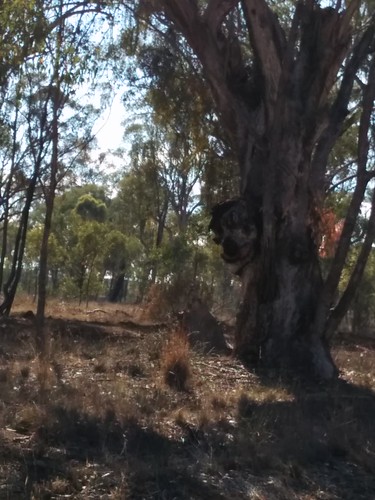
Before this trip to Barraba I tried to describe to myself the difference between my father’s town of a thousand souls and my own beloved city of San Francisco, population 800k but arguably way fewer souls. There are the giveaway jokes: Barraba used to have an asbestos mine, and just missed out on a new abattoir. In New York, everyone’s writing a novel; in LA, they’re working on a screenplay; in SF, they’re building an app.
That second joke gave me a clue. I love the density of narrative in cities, the plaques on London’s Georgian houses, the ghost of the railroad through the Mission, the undergrounded waterways. I thought for a while that Barraba is relatively empty of stories, until I remembered with a stab of sorrow that it used to be full of them, but that my ancestors tried to kill all the people that knew them.
Barraba is in Gamilaraay country. One story I do know is that of the Myall Creek Massacre.
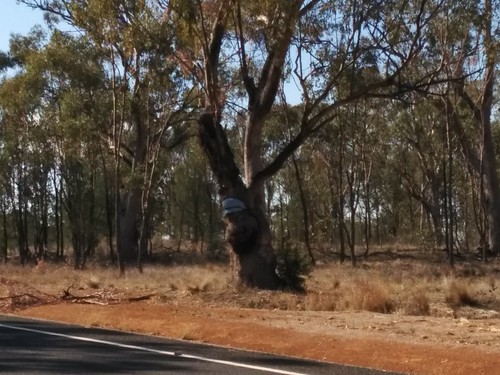
I’ve spent enough time in Barraba to have made good friends and learned a little of their stories. Pam has a great one about her husband Ted riding across a flooded creek to be with her when she had a baby; she remembers the sight of him galloping up to the house, surrounded by a halo of flies. Jane’s family owns a property called Wiry, which I had assumed was an Aboriginal name. Turns out it was part of the land grants to returned soliders, and because it’s a relatively hilly and inaccessible property, the recipient grumbled “Wouldn’t it root ya.” More giveaway jokes.
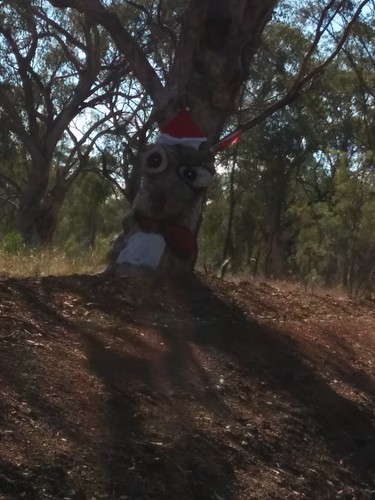
Jane asked me flat out what all seven of you remaining blog readers have probably been wondering: “Are you neglecting the blog because the stuff you’re thinking about is too intense and sad?” Yup. But something really terrific has happened. A researcher has become interested in Dad’s blog, which was critical to his diagnosis of semantic dementia. We have 17 years’ worth of his written records as his condition developed – more than five times the length of the next longest case study. Joanna believes we can extract psycholinguistic markers of the changes to his vocabulary that may help scientists to develop more sensitive diagnostic tests.
As part of collating the material for Joanna, I read a few of Dad’s earliest blog entries. He had a decent line in giveaway jokes of his own:
Tue 10 Feb 1998
Got away late from Sydney. Lasted on the road until 6 o’clock at which time we found ourselves in Gunning, between Goulburn and Gundagai.
Gunning is a town of a thousand souls and very few outstanding features.
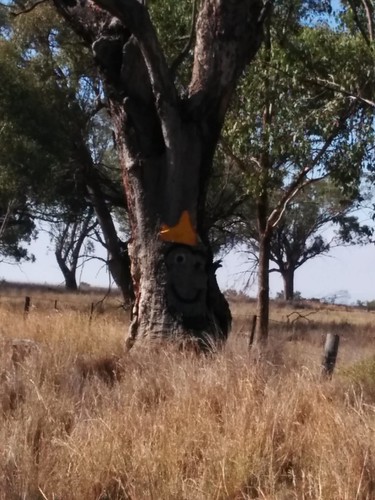
Death is the eater of meaning. It swallows up whole universes, erases stories from the landscape.
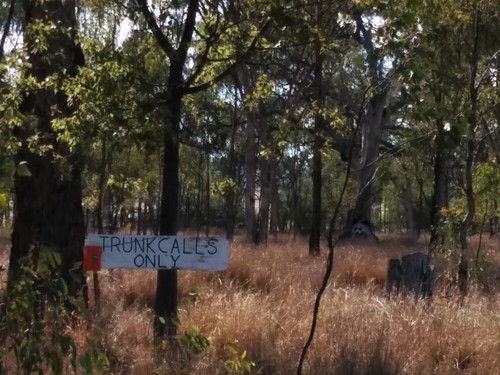
The work of grief is to make sense of loss. We have to make new narratives to mark the place of those that are gone.

We have to find the faces in the forest.
Posted in adventure time, australia, bookmaggot, grief, history, hope, mindfulness, politics, san francisco, sanity, words | Comments Off on the forest of faces
Saturday, April 26th, 2014
We’re back in the first person. Wilmet, the narrator of Glass, is the smuggest and most unpleasant of Pym’s heroines. I should confess to my own feelings of unpleasant smugness when she gets her (surprisingly progressive) comeuppance.
I’m hugely enjoying the continuity in the Pym universe. Wilmet is Archdeacon Hoccleve’s distant cousin. She and her friend Rowena knew Rocky Napier in Italy, and Wilmet’s husband Rodney has a dalliance with Prudence. Best of all, Rowena reads to Wilmet out of a magazine, and what she reads is Catherine Oliphant’s fictionalized account of the moussaka scene.
But the weirdest moment by far in Glass is when *I* show up in it.
I thought he might be a colonial, perhaps a New Zealander. I remembered clever moody passionate girls, like Katherine Mansfield, striving to break away from the narrowness of their environment, almost nineteenth century Russian in their yearnings, hating the traditional English Christmas in the middle of summer and the sentimental attitude toward the Mother Country.
Since women like me are represented in English literature with considerably less frequency than most breeds of dog, it always comes as a bit of a shock.
Austen parallel: Mansfield Park. (It’s “about ordination.”)
Dulcie, the protagonist of Fond, is a tragic figure because she lives in a world without Google. Her ability to Googlestalk before the fact is both impressive and creepy. She gets one of the best proposal-rejection scenes so far. I was starting to think that this novel took place outside the Pymiverse until Dulcie ran into Wilmet at a castle.
Austen parallel: Dulcie thinks she’s in Persuasion, but I think she’s in Northanger Abbey.
This marks the break in Pym’s career. She was bumped off the midlist after Fond and didn’t get anything published for another eighteen years. A good time for me to take a break too, I think.
Posted in bookmaggot, england | Comments Off on a glass of blessings/no fond return of love, by barbara pym
Sunday, April 13th, 2014
Sexy, independent Catherine Oliphant is the best Pym heroine so far. No frustrated literary yearnings for her: she writes romantic fiction for women’s magazines. Even as she catches her beloved in the act of having an intimate dinner with her replacement, she thinks to herself that their moussaka will be getting cold. She chooses her next crush on the basis of his resemblance to an Easter Island statue. I adore her.
The church takes a step back in this book and the vacuum is filled by anthropology. The resulting shabby-intellectual milieu is surprisingly reminiscent of Iris Murdoch.
Posted in bookmaggot, england | Comments Off on less than angels, by barbara pym






